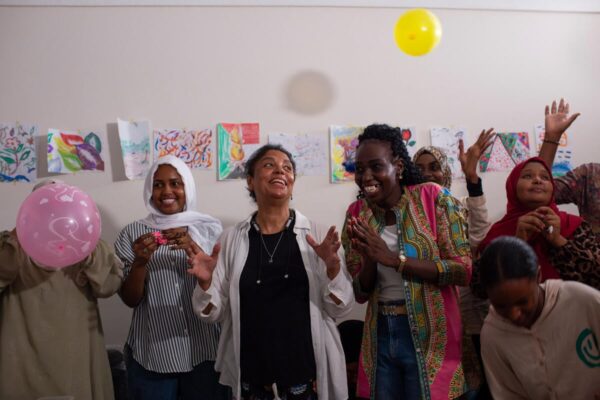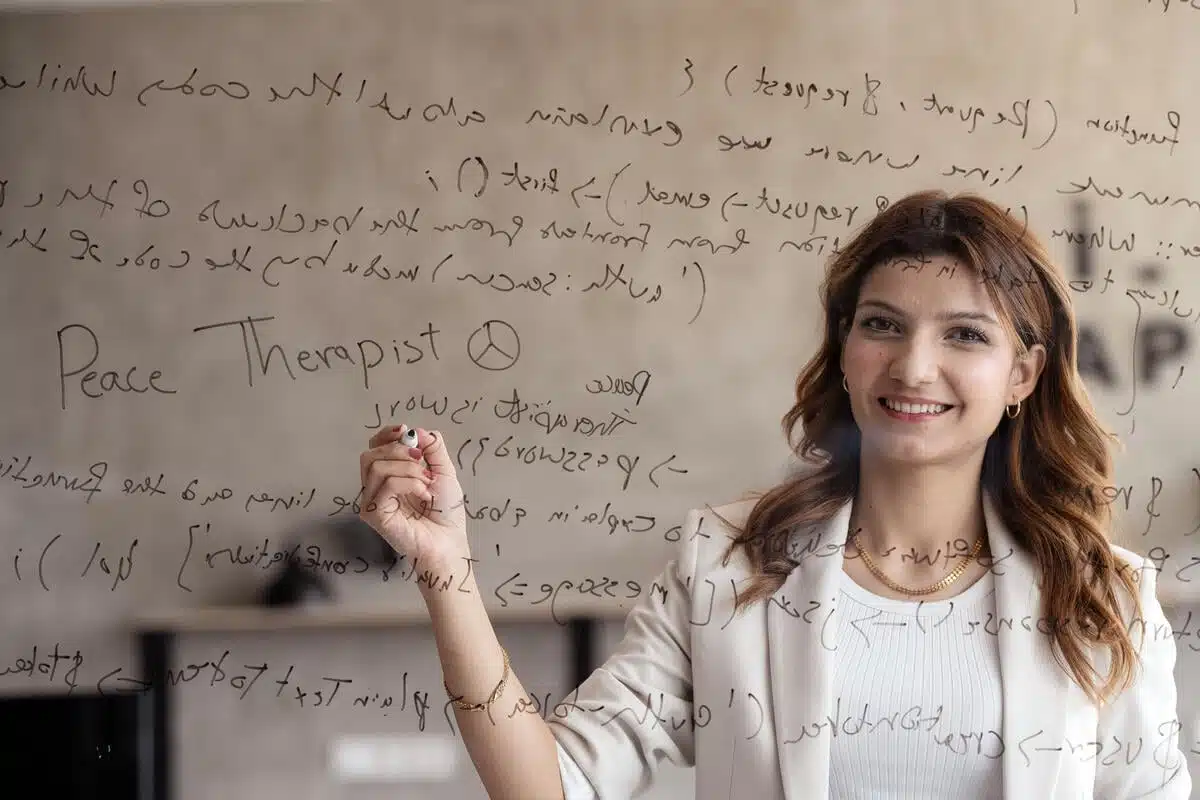
Jin Davod writes the algorithm for her online platform, “Peace Therapist”, which provides mental health services to refugees and Turkish citizens. She is the 2024 regional winner for Europe of the UNHCR Nansen Refugee Award. © UNHCR/Ana Brigida
Social entrepreneur Jin Davod developed an innovative online platform that has provided thousands of refugees in Türkiye and elsewhere with access to free mental health services
By Kristy Siegfried
Jin Davod’s first thought on being jolted out of her sleep before dawn on 6 February, 2023, was that a bomb, like the ones that had narrowly missed her and her family in Syria nine years earlier, was about to fall on their apartment building in Şanlıurfa, southern Türkiye. Within seconds, she realized it was not a bomb but an earthquake and that she, her parents and three younger siblings needed to get out of the building as quickly as possible.
“My father was trying to open the door, but it was shaking so much that he couldn’t turn the key,” recalls Jin. “It was seconds, but it felt like hours. Finally, when he opened the door, we ran as fast as we could.”
Barefoot and shivering in their pyjamas, the family made it to their car, where they would spend much of the next few days waiting for the aftershocks to subside.
That same day, Jin went onto social media and shared a helpline for Peace Therapist, the online platform she had designed, built and launched a year earlier to connect refugees and Turkish citizens with mental health services in multiple languages.
“I wrote that it was free for anyone affected by this earthquake,” she says.
Within hours, she received 200 requests for support and within days, several thousand. The requests came from both refugees and Turkish people who had been traumatized by the powerful 7.8 magnitude quake and the thousands of aftershocks that followed.
“I was so shocked by the number, and I also felt the responsibility to do something for these people,” Jin recalls. “So, I contacted our psychologists who were working remotely, and they started to do many hundreds of hours of psychological first aid.”
Terrors of war
It was the type of support that Jin herself had so desperately needed when she arrived in Şanlıurfa with her family as a traumatized 16-year-old in 2014.
She had spent a happy childhood in the northern city of Raqqa, where her father, Hasan, was a well-known dentist. Jin was a hard-working student, focused on her goal of studying medicine and becoming a doctor. “My life was planned – which university I would go to, what I would study, where I would stay.”
The conflict changed all that, but her family did not immediately recognize the danger. “The bombing and the fighting started to come but we were still not really understanding that this was war, and we should get out. Then ISIS came and the really bad things started.”

Jin Davod with her parents and siblings at their home in Şanlıurfa. © UNHCR/Ana Brigida
Jin’s home was surrounded by government buildings that were occupied by the militants, making the neighbourhood a target for air strikes. The family huddled together in their apartment in a perpetual state of terror. “The sound of bombing was constant. I couldn’t eat anything, and I didn’t sleep at all because the moment I went to sleep, I thought I wouldn’t see my family again,” recalls Jin.
The day a bomb landed in the garden outside their apartment building, blowing out one wall of Jin’s bedroom, the family finally understood it was time to leave, but they had to wait several months for the right moment.
When that moment arrived early one morning, they fled the city by car. Moments after they reached Türkiye, they received a phone call from a neighbour telling them that their apartment building had been destroyed by a bomb. There would be no return to the home Jin had grown up in, and she would never know the fate of many of her friends and neighbours.
From trauma survivor to entrepreneur
In Şanlıurfa, the family moved into a rented apartment that Jin did not leave for a year. “I was in a miserable state,” she says. “I had post-traumatic stress and nightmares. I didn’t want to do anything; I just stared at the wall.”
She had yet to learn Turkish and knew of no counselling services available in her native language.
Eventually, with her parent’s encouragement, she decided to rekindle her dreams of studying medicine. She spent the next two years learning Turkish and studying for high school and university entrance exams before being accepted to Haran University, not to study medicine but her second choice, computer engineering.
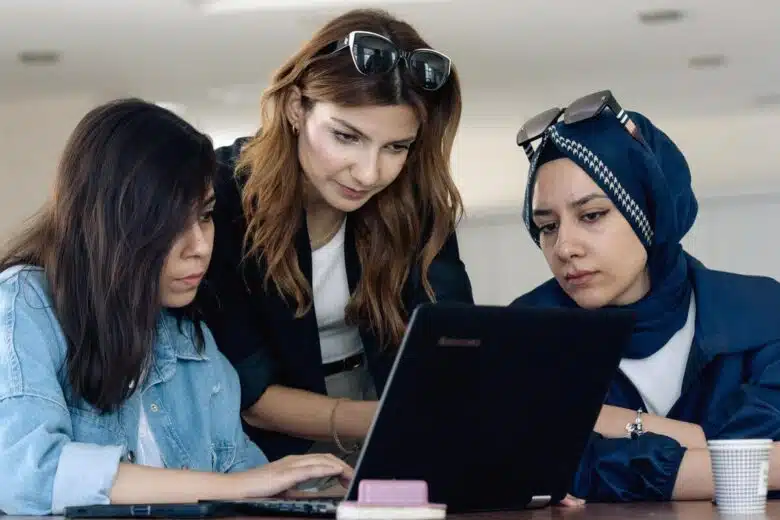
Jin at work with her assistant Rasha Guzel (left) and Turkish psychologist Hatice Koroglu (right). © UNHCR/Ana Brigida
It was while attending two boot camps in her second year, one on developing Android applications and the other on entrepreneurship, that she came up with the idea for Peace Therapist. “At that moment, I started working on it; it was like a hope for me,” she says. “For all of the hardships and experiences I had, I was sure someone else in another place was having them.”
She developed a detailed business plan and began working with software developers and psychologists to build the platform. The company launched two years later and now has a roster of 100 psychologists who provide online therapy sessions in Turkish, Arabic, Kurdish and English. While those who can afford it pay for individual or group sessions, vulnerable populations such as refugees can access them free of charge.
Reducing stigma
According to Suhail Ahmed, a Syrian psychologist who has been working with Peace Therapist for the past year, delivering therapy online addresses some of the barriers preventing people from seeking help with for their mental health.
“This platform ensures confidentiality and that reduces stigma,” he says. “By doing it online, they feel free to speak because there is no judgement, they can talk about even taboo topics.”
A common issue among his Syrian clients is trauma linked to the crisis and the earthquake, but also anxiety and depression relating to their situation in Türkiye.
When a friend told Mahmut El Shekh, a 63-year-old former tailor from Raqqa, about Peace Therapist, he was sceptical, but he filled out the online form and was quickly connected with Suhail. “When Mr. Suhail asked me about my problem, I told him I feel like I have been alone for 100 years,” recalls Mahmut.
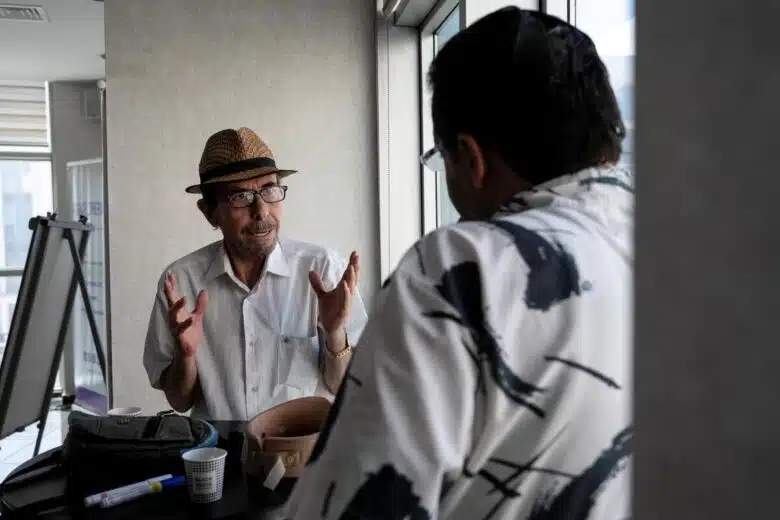
Mahmut El Shekh, Syrian refugee and a client of Peace Therapist, speaks to his psychologist Suhail Ahmed. © UNHCR/Ana Brigida
“Without Peace Therapist, maybe my life would still be empty.”
Mahmut El Shekh
Back in Raqqa, he had been a social person with many friends. In Şanlıurfa, unable to work due to a neck injury, and grieving for family members he had lost during the war, he sank into depression.
His sessions with Suhail became something he looked forward to. “He listened to me, and he sent me links to books we would discuss. He also encouraged me to do some exercise and start playing music again with my friends.”
Mahmut now feels better able to manage his mental health and to understand what his family members might be going through. “As Arab people, we don’t think mental problems are a sickness you can ask for help with, but that’s wrong.”
“Without Peace Therapist, maybe my life would still be empty,” he says, adding that he now feels more hopeful about the future.
Born out of war
For her dedication to providing mental health support to refugees and other survivors of trauma, Jin has been selected as the 2024 regional winner for Europe of the UNHCR Nansen Refugee Award.
“The feedback from our beneficiaries is the biggest reward for me, but winning this award is so meaningful,” she says. “It gives me the motivation and courage to continue this work.”
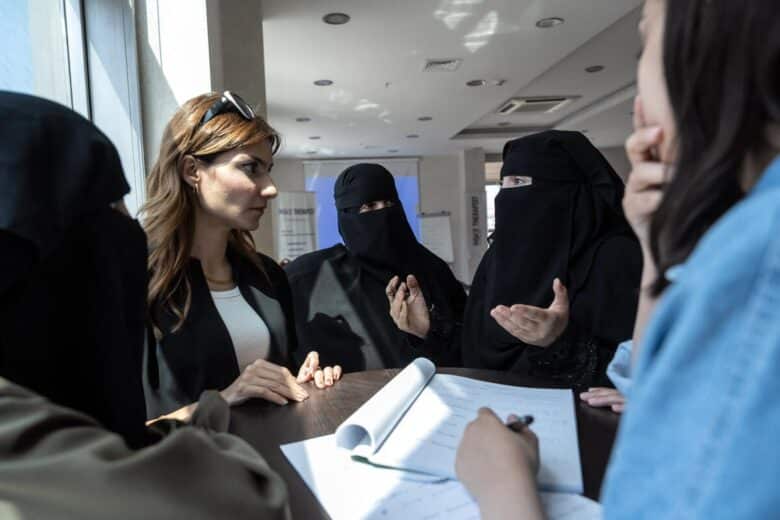
Jin in conversation with woman attending a Peace Therapist training for mothers of children with mental health issues at the Şanlıurfa Chamber of Commerce and Industry. © UNHCR/Ana Brigida
“The feedback from our beneficiaries is the biggest reward for me.”
Jin Davod
As recovery from the earthquake continues in Türkiye amid a weak economy, the need for Peace Therapist’s services is only growing. Jin plans to expand the platform’s reach by recruiting more psychologists and collaborating more with humanitarian organizations.
“Peace Therapy was born because of war, so our mission is always to build peace – inner peace and peace in the world,” she says. “It all starts from inside of us.”
Originally published. by UNHCR on 9 October 2024.




